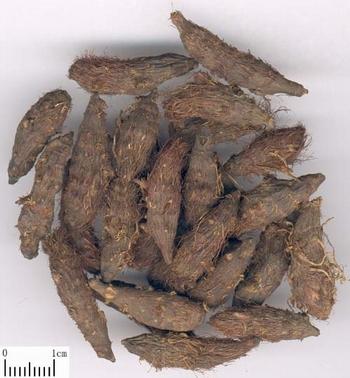Xiang Fu
The Processing of Xiang Fu
Origin
The rhizome of Cyperus rotundus L. of family Cyperaceae.
Location
Most parts in China.
Harvest
Collected in autumn.
The true smell and taste
Fragrant, slightly bitter.
Best quality
Big, full, brown, massy, strongly fragrant.
Processing
Unprocessed or prepared with vinegar.
The Effect of Xiang Fu
Property
Pungent, slightly bitter and sweet, bland; liver and triple energizer meridians entered.
Actions
Soothe liver and regulate qi, regulate menorrhea and alleviate pain.
Indications
A. Liver depression and qi stagnation syndrome
It is good at soothing liver and regulating qi to alleviate pain, and indicated for the syndrome of liver depression and qi stagnation. For emotional depression and hypochondriac distending pain due to liver qi stagnation, it is usually combined with the liver-soothing and qi-moving herbs. For instance it is combined with Chai Hu and Zhi Qiao in Chai Hu Shu Gan San from Jing Yue Quan Shu. For invasion of stomach by liver qi due to congealing cold and qi stagnation manifested as stomachache, it is usually combined with the middle-energizer-warming and pain-alleviating herbs. For instance it is combined with Gao Liang Jiang in Liang Fu Wan from Liang Fang Ji Ye. For colic pain or orchidoptosis, it is usually combined with the middle-energizer-warming, qi-moving and pain alleviating herbs such as Xiao Hui Xiang, Wu Zhu Yu and Wu Yao.
B. Menoxenia, dysmenorrhea, breast distending pain
It is the essential herb for regulating qi and menorrhea, and alleviating pain in gynecology for it can regulate qi and blood circulation, soothe stagnant liver qi. For delayed menstruation due to liver depression and qi stagnation, it is usually combined with the blood-activating and menorrhea-regulating herbs. For instance it is combined with Dang Gui and Chuan Xiong in Xiang Fu Xiong Gui Tang from Fu Ke Yu Chi (Jade Rules for Gynecology). For menoxenia due to deficiency-cold of uterus, it is usually combined with the meridian-warming, cold-dispering and menorrhea-regulating herbs. For instance it is combined with Ai Ye, Rou Gui and Wu Zhu Yu in Ai Fu Nuan Gong Wan from Ren Zhai Zhi Zhi Fang Lun. For abdominal pain during menstruation due to qi stagnation and blood stasis, it can be made into pill alone after prepared with wine, salt water and vinegar and mixed with vinegar. For instance it is prepared in this way in Si Zhi Cu Fu Wan from Chong Ding Rui Zhu Tang Jing Yan Fang (Revised Experiential Prescriptions from Ruizhu Clinic); or it can be combined with the blood-activating, menstruation-regulating and pain-alleviating herbs such as Dang Gui, Chuan Xiong, Bai Shao and Yan Hu Suo. For distending pain or mass in breast due to liver depression and qi stagnation, it should be combined with the qi-moving and nodulation-dissipating herbs such as Qing Pi, Gua Lou and Chai Hu.
Dosage and Administrations
Decoct 6~10 g.
